

‘We don’t really need phones’: the French school that banned mobiles. It’s breaktime at a middle school in rural Brittany, and huddles of teenagers are chatting in the playground.
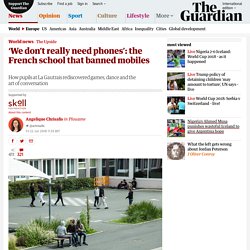
Two 15-year-olds sit reading novels, while others kick footballs or play chase. One boy does some press-ups. Press release: Teaching and EdTech trends 2018. AUSTIN, Texas, May 23, 2018 — Teachers are increasingly using data-driven instruction and intervention in U.S.
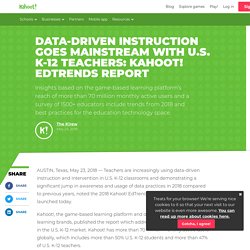
K-12 classrooms and demonstrating a significant jump in awareness and usage of data practices in 2018 compared to previous years, noted the 2018 Kahoot! EdTrends Report for educators, launched today. Kahoot! A Diagram Of 21st Century Pedagogy - A Diagram Of 21st Century Pedagogy by TeachThought Staff The modern learner has to sift through a lot of information.
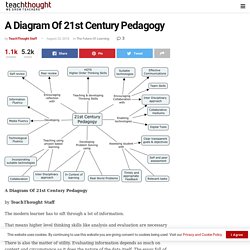
That means higher level thinking skills like analysis and evaluation are necessary just to reduce all the noise and establish the credibility of information. Researchgate. Gmail - Free Storage and Email from Google. A Diagram Of 21st Century Pedagogy - What are belief systems. Use of diaries to investigate and track pre-service teachers’ beliefs about teaching and learning English as a foreign language throughout a pre-service training program. JavaScript is disabled on your browser.
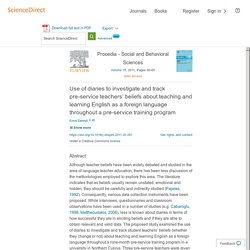
Please enable JavaScript to use all the features on this page. Abstract Although teacher beliefs have been widely debated and studied in the area of language teacher education, there has been less discussion of the methodologies employed to explore this area. The literature indicates that as beliefs usually remain unstated, emotional and hidden, they should be carefully and indirectly studied (Pajares, 1992). Consequently, various data collection instruments have been proposed. Наука - Мне кажется, среди тв-форматов очень не хватает...
1 s2.0 S1877042815046169 main. Jokes about teacher beliefs - Recherche Google. SwiftScribe. What Is Successful Technology Integration? Technology integration is the use of technology resources -- computers, mobile devices like smartphones and tablets, digital cameras, social media platforms and networks, software applications, the Internet, etc. -- in daily classroom practices, and in the management of a school. Successful technology integration is achieved when the use of technology is: Routine and transparent Accessible and readily available for the task at hand Supporting the curricular goals, and helping the students to effectively reach their goals When technology integration is at its best, a child or a teacher doesn't stop to think that he or she is using a technology tool -- it is second nature.
And students are often more actively engaged in projects when technology tools are a seamless part of the learning process. The problem with technology in schools. Instant access to information has revolutionized how students learn today.
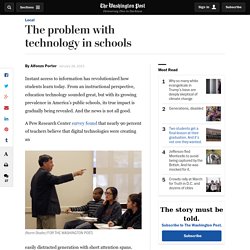
From an instructional perspective, education technology sounded great, but with its growing prevalence in America’s public schools, its true impact is gradually being revealed. And the news is not all good. Nietzsche on Truth, Lies, the Power and Peril of Metaphor, and How We Use Language to Reveal and Conceal Reality. How to deal with online learning 'deniers' in your institution.
Lieberman, M. (2018) Overcoming faculty resistance – or not?
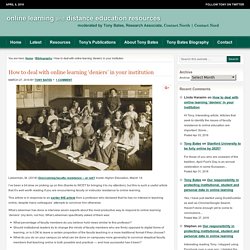
Inside Higher Education, March 14 I’ve been a bit slow on picking up on this (thanks to WCET for bringing it to my attention), but this is such a useful article that it’s well worth reading if you are encountering faculty or instructor resistance to online learning. This article is in response to an earlier IHE article from a professor who declared that he has no interest in teaching online, despite many colleagues’ attempts to convince him otherwise. What Lieberman has done is interview seven experts about the most productive way to respond to online learning ‘deniers’ (my term, not his).
Constructivism vs. Constructivism vs. Constructionism. March 19, 2018 at 9:00 am I wrote the below in 1997.
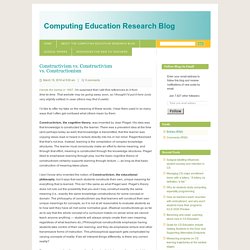
I’m surprised that I still find references to it from time-to-time. That website may be going away soon, so I thought I’d put it here (only very slightly edited) in case others may find it useful. I’d like to offer my take on the meaning of these words. I hear them used in so many ways that I often get confused what others mean by them. Ten search engines for researchers that go beyond Google.
Using search engines effectively is now a key skill for researchers, but could more be done to equip young researchers with the tools they need.
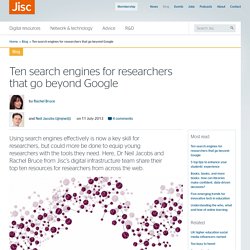
Here, Dr Neil Jacobs and Rachel Bruce from Jisc’s digital infrastructure team share their top ten resources for researchers from across the web. Every click of the mouse, every search box, needs to work hard to make the best use of a researcher’s time. For each gem of a resource that a researcher discovers, there may be a dozen abandoned web pages, armies of half-read abstracts and false leads. Implications Of Learning Theories On Instructio...
7 Digital Learning Theories and Models You Should Know. While pursuing our teaching degrees we were introduced to various learning theorists and their insights about how people learn best.
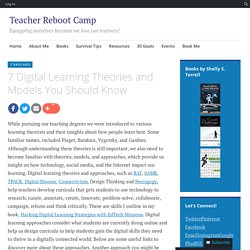
Some familiar names, included Piaget, Bandura, Vygotsky, and Gardner. Although understanding these theories is still important, we also need to become familiar with theories, models, and approaches, which provide us insight on how technology, social media, and the Internet impact our learning. Digital learning theories and approaches, such as RAT, SAMR, TPACK, Digital Blooms, Connectivism, Design Thinking and Peeragogy, help teachers develop curricula that gets students to use technology to research, curate, annotate, create, innovate, problem-solve, collaborate, campaign, reform and think critically.
These are skills I outline in my book, Hacking Digital Learning Strategies with EdTech Missions. Get your copy of Hacking Digital Learning, The 30 Goals Challenge, or Learning to Go. Digital Natives, Yet Strangers to the Web. When Reuben Loewy took up his first teaching gig in 2012, he had a major revelation: The digital revolution has dramatically transformed the way that kids perceive reality.
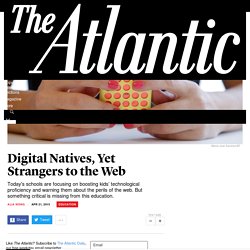
Perhaps that makes the 55-year-old teacher sound like a dinosaur. What he discovered is, after all, one of the most obvious realities shaping education policy and parenting guides today. But, as Loewy will clarify, his revelation wasn’t simply that technology is overhauling America’s classrooms and redefining childhood and adolescence. Rather, he was hit with the epiphany that efforts in schools to embrace these shifts are, by and large, focusing on the wrong objectives: equipping kids with fancy gadgets and then making sure the students use those gadgets appropriately and effectively. School technology not delivering as promised – is it actually more of a distraction than a help? – Missouri Education Watchdog. The difference between promise and delivery for technology in the classroom today is causing teachers to have to span an impossibly wide gap.
Two years ago Superintendents were asked to sign a Future Ready technology pledge which asked them to do everything they could to bring technology into their schools. The vision that pledge created was of students diligently working on some sort of device not only learning core subject material in an exciting and innovative way, but also becoming little technology experts themselves. The mischaracterization of children being technology resistant like their grandparents, or maybe even parents, thus necessitating exposure to technology as soon as possible, was foolish. A brain with no established neural pathway for a particular tool is actually more apt to readily adapt to a new tool than one which must overwrite existing pathways for a similar older tool.
Failures in Education: Constructivism and 21st Century Skills – Missouri Education Watchdog. Education is global and 21st Century skills are pursued in many countries based on theories from education reformers and non-governmental organizations. Newly trained teachers have been taught children have been mis-educated and cannot possibly compete in the global workforce. What is needed in current and future educational goals should not be decided by local communities, it should be planned by private organizations such as Council of Chief State School Officers (CCSSO) here in the United States or by such organizations as the Global Education Reform Movement (GERM).
The NGOs insist their educational involvement and direction will raise educational attainment and help ensure a work-ready citizenship. 25 years of EdTech – 1997: Constructivism. In 1997 web based learning was getting a lot of traction, and with it people began to look around for new models of teaching. So for 1997 I’m not focusing on a technology, but rather an educational theory because there’s education in educational technology after all. Constructivism was by no means new, dating back to Piaget, Vygostky and Bruner. The Difference Between Knowledge and Experience. Shifting to 21st Century Thinking » A Change Theory: Key Concepts for Understanding the Work of Robert Kegan. General Rationale and Approach In over our heads: Robert Kegan believes that the constantly changing demands of modern life may be developmentally inappropriate for many—perhaps even most—adults. We should no more blame or punish adults for their inability to meet the challenges of their lives than we would punish an infant for not being able to turn over, or a five-year-old who had not mastered abstract thinking.
Instead of blaming adults for simply being unable to meet these demands, Kegan asks that we learn how to support development—and have the patience to wait for it to come. He says, “The expectations upon us…demand something more than mere behaviour, the acquisition of specific skills, or the mastery of particular knowledge. Are computers in class a scandalous waste of money?
Quotes to Provoke Technology-inspired Teaching and Learning - Read Write Respond.
EdTech Research - Where to Publish, How to Share (Part 1): Journal Overview - AACE. Some Very Good Research Methodology Textbooks for Research Students. Li li University of Exeter. EdTech Research - Where to Publish, How to Share (Part 1): Journal Overview - AACE. Google Image Result for. Gmail - Free Storage and Email from Google. Education Week American Education News Site of Record. The Best Literature Review: 45 Great Tips on Format and Structure.
PCP film 1 Personal Construct Psychology and Qualitative Grids.